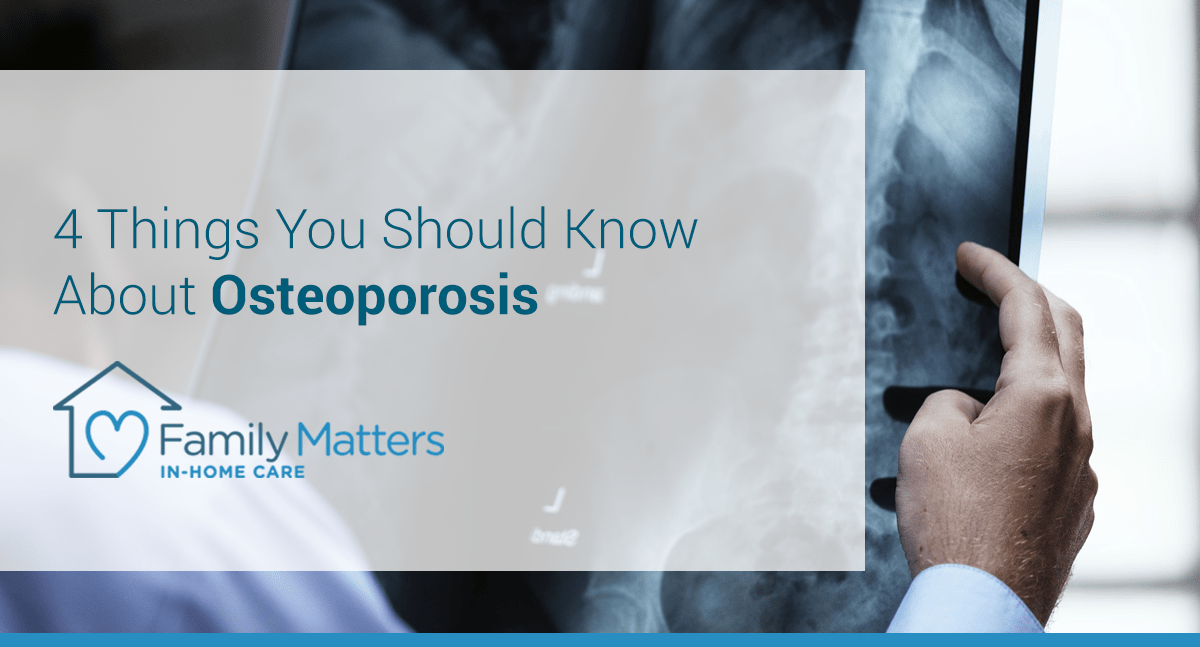
4 Things You Should Know About Osteoporosis
Osteoporosis is a disease that weakens bones and makes them more fragile. It poses great risk to seniors because it can significantly increase the risk of broken bones and falls. In fact, bones can become so fragile that something as simple as a sneeze can result in a broken bone. Approximately 54 million Americans have osteoporosis and a condition called “low bone mass”. Here are four things you should know about osteoporosis.
1. Osteoporosis can affect both women and men
Osteoporosis occurs when the living tissue of the bone does not regenerate. In normal bones, new tissue grows to replace the old tissue. Osteoporosis prevents that from happening and a result the old bone tissue remains in place, becoming more fragile and brittle over time. Both men and women can develop the disease, but women are more susceptible to it as estrogen levels tend to decline rapidly after menopause. It’s estimated that one in every two women and up to one in four men have the disease.
One of the biggest challenges with osteoporosis is that it is a silent disease. It’s not possible to actually feel bones weakening. Only a bone density test can detect if osteoporosis is present.
2. The signs and symptoms of osteoporosis can include:
- Loss of height over a period of time
- Inability to stand up straight and a stooped posture
- Bones break more easily than normal
- Back pain, often caused by a broken or collapsed bone (vertebra) in the back
3. Bone breaks from osteoporosis are serious
Because osteoporosis causes bones to become brittle, any bone can be at risk of breaking. Seniors with osteoporosis may break bones in their hip, spine, wrist or ankle. Bone breaks may cause them to lose height, become hunched over, or have long-term limited mobility.
Broken bones can be serious for seniors because recovery can take a long time. New bone tissue does not generate normally and as a result, bone healing may take longer. It may require surgery and in many cases, extended rehabilitation. Even with proper therapy, many seniors never properly recover from broken bones and live with chronic pain. The National Osteoporosis Foundation says that twenty percent of seniors who break a hip die within one year from either complications related to the broken bone itself or the surgery to repair it. Many patients require long-term nursing home care.
4. Some diseases and medications can cause osteoporosis
There are many different causes of osteoporosis and common diseases and medications are among them. It is important to know that these may play a role in the onset of the disease so that it can be discussed with a senior’s physician.
Diseases that may lead to osteoporosis include (not a complete list):
- Rheumatoid arthritis (RA)
- Multiple sclerosis
- Celiac disease
- Breast cancer
- Prostate cancer
- Leukemia and lymphoma
- Multiple myeloma
- Stroke
- Parkinson’s disease
- Multiple sclerosis (MS)
- Diabetes
- Low levels of testosterone and estrogen in men
- AIDS/HIV
- Chronic obstructive pulmonary disease (COPD), including emphysema
- Poor diet, including malnutrition
- Scoliosis
Some medications may lead to bone loss. Discuss all medications and potential side effects with your loved one’s physician. Medications that can contribute to osteoporosis or low bone density may include, (not a complete list):
- Aluminum-containing antacids
- Some anti-seizure medicines such as Dilantin® or Phenobarbital
- Cancer chemotherapeutic drugs
- Heparin
- Depo-Provera® for contraception
- Nexium®, Prevacid® and Prilosec®
- Lexapro®, Prozac® and Zoloft®
- Steroids such as cortisone and prednisone
If your senior loved one has recently broken a bone or has a posture that seems more stooped or hunched than normal, mention it to his or her physician and discuss osteoporosis. Ask that they review any diseases your loved one has and the medications they are taking in case they could be contributing to the disease. A bone density test may be in order to determine if osteoporosis is present. Knowing whether or not your loved one has the disease can help you to keep them safe, prevent falls, and avoid broken bones.
If you or your family member is considering in-home care as part of a plan to age in place, contact Family Matters In-Home Care today for a free consultation. Our team is dedicated to supporting your family and helping older adults enjoy life in the comfort of their own home for as long as possible.
Some of the services offered by Family Matter In-Home Care include: Alzheimer’s & Dementia Care, Bed & Wheelchair Transfer Assistance, Companionship, Housekeeping & Meal Preparation, Personal Care, Recovery Care, and Transportation.
